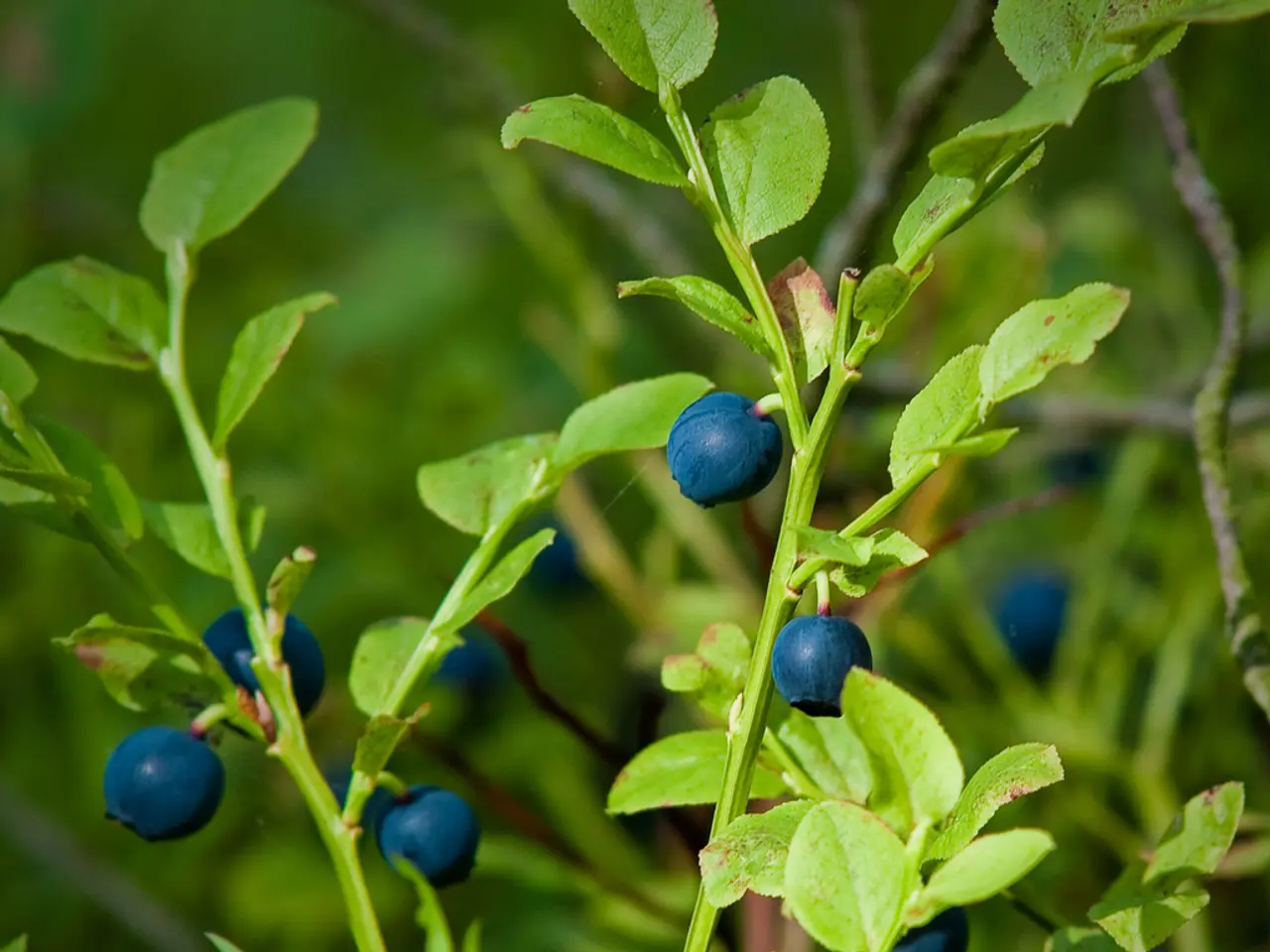Seventeen Type of Plants Rich in Berries, Highly Attractive to Various Bird Species
In a garden, berry plants aren't just for human consumption. They can also serve as a delicious and nutritious treat for a wide variety of bird species. Here are some popular berry plants that are recommended for a bird-friendly garden:
- American Beautyberry (Callicarpa americana): This plant produces vibrant magenta berries that attract over 40 bird species, such as gray catbirds, northern mockingbirds, northern cardinals, and house finches. It also feeds migrating warblers and other Neotropical migrants.
- Holly (Ilex aquifolium): An evergreen shrub, holly boasts bright red berries that persist into winter, providing food for robins, bluebirds, and cedar waxwings.
- Mulberry (Morus nigra): A deciduous tree, mulberry offers sweet purple fruits that are favored by cardinals, grosbeaks, and robins.
- Serviceberry (Amelanchier spp., e.g., 'Regent' variety): This early blooming shrub produces deep purple, sweet, and juicy fruit loved by birds. It attracts birds early in the season and is hardy across many U.S. zones.
- Elderberry, Chokeberry, and Dogwood: These shrubs and trees produce berries that many birds enjoy. Elderberry, in particular, is a magnet for cedar waxwings and robins during late summer and early fall, while chokeberry offers tart berries that ripen in fall, which are loved by cedar waxwings and chickadees. Dogwood offers blue-black berries that song sparrows and thrushes find irresistible.
- Viburnum (e.g., ‘Winterthur’): This plant produces pink, blue, and deep purple berries from late summer to fall, attracting cardinals, bluebirds, thrushes, waxwings, and northern mockingbirds.
- Blackberries and Huckleberries: These berries attract tanagers as well as other birds like thrushes and finches.
- Firethorn (Pyracantha coccinea): This plant adds a striking element to the garden with vivid red and orange berries, attracting blackbirds, especially in colder months.
- Crabapple (Malus sylvestris): This tree attracts bluebirds, robins, and cedar waxwings with its small fruits.
- Nannyberry (Viburnum lentago): This plant produces clusters of black berries that mature in the fall, serving as a key food source for cedar waxwings and other fruit-loving birds.
- Mountain Ash (Sorbus aucuparia): This tree provides orange-red berries for birds like waxwings and thrushes during winter.
- Juneberry (Amelanchier spp.): This shrub attracts chickadees and orioles with its sweet, reddish-purple berries.
In addition to these berry-producing plants, consider incorporating Monarda (bee balm) in your garden. While primarily known for nectar, bee balm also provides seeds that attract birds like goldfinches and sparrows after flowering.
By incorporating a mix of these berry-producing shrubs and trees in your garden, you can help create an inviting, bird-friendly habitat.
- To enrich your lifestyle, you may consider adding fashion-and-beauty items like Monarda, also known as bee balm, to your garden. Although it's primarily known for its nectar, it also offers seeds that attract birds, such as goldfinches and sparrows, after flowering.
- For those who enjoy food-and-drink, why not grow your own berry plants for human consumption and bird-feeding purposes? Berry plants like the American Beautyberry, Holly, Mulberry, Serviceberry, Elderberry, Chokeberry, Dogwood, Viburnum, Blackberries, Huckleberries, Firethorn, Crabapple, Nannyberry, Mountain Ash, and Juneberry not only provide delicious fruits but also attract a variety of bird species.
- If you have a home-and-garden project this year, think about creating a bird-friendly garden by incorporating berry-producing shrubs and trees. This not only contributes to your relationship with nature but can also enhance your travel experiences if you have an interest in spotting diverse bird species.
- For pet owners, maintaining a bird-friendly garden can provide an opportunity to observe birds closely. You might find your pets becoming fascinated by the colorful and lively birds that visit your garden for food.






